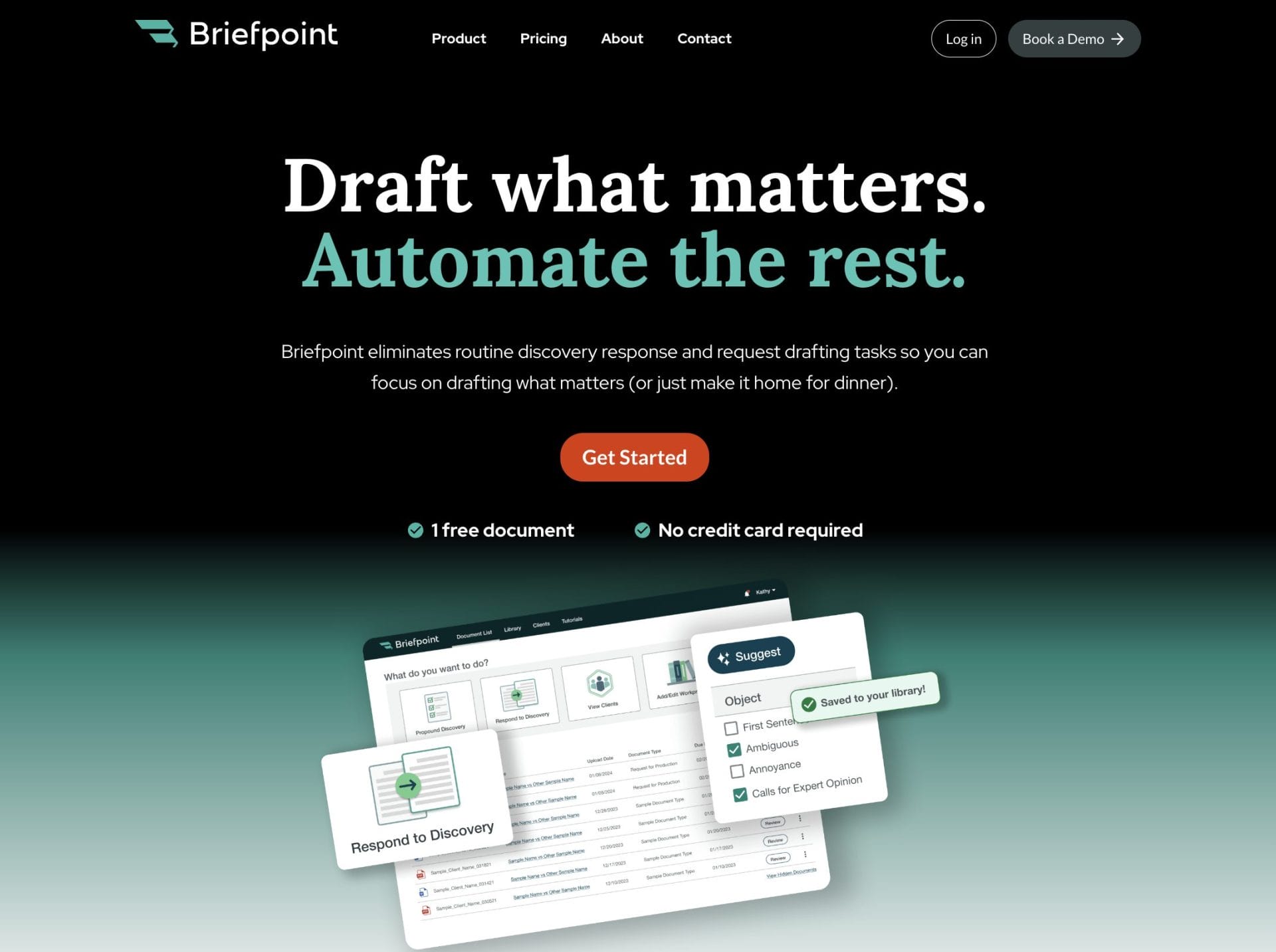Best Software for Lawyers: Your Tech Stack Guide for 2024
Best Software for Lawyers: Your Tech Stack Guide for 2024
Imagine a world where your legal practice runs like a well-oiled machine—where hours of paperwork are reduced to mere minutes, case management is simplified with a few clicks, and legal research is instantly accessible.
Welcome to the revolution of legal tech. The writing’s on the wall: this groundbreaking tech is where the legal profession is headed.
With tools that automate documents, secure electronic signatures, and provide comprehensive practice management powered by AI, legal tech is here to elevate your practice. Ready to step into the future?
Let’s explore the best software for lawyers in 2024 and see how it can transform your practice.

What is Legal Technology?
Legal technology, or legal tech, refers to software and tools designed to make the lives of lawyers and legal professionals easier.
What if you could cut down hours of paperwork into mere minutes, manage cases with a few clicks, or have all your legal research at your fingertips? Legal tech makes it all possible.
From document automation and electronic signatures to comprehensive project management software and AI-powered research tools, legal tech helps simplify operations, optimize productivity, and improve client service.
9 Types of Legal Technology & Top Tools
Legal technology covers a wide range of tools designed to help lawyers manage their work more efficiently. Here are some key types of legal tech and the top tools in each category:
1. Document Automation Software

Creating legal documents manually can be a tedious and time-consuming process, often riddled with the potential for errors. This is where document generation software steps in to revamp the way lawyers handle paperwork.
Creating legal documents has never been easier–or faster–thanks to these automated tools that skip the hassle and grab the facts. A robust document generator usually comes packed with clever tools like versatile templates, automated text insertion, and the ability to fetch data from disparate sources, culminating in polished documents.
One standout in this field is Briefpoint.ai. Briefpoint.ai leverages advanced generative AI technology to help lawyers create accurate and professional discovery documents quickly.
All the user has to do is upload the discovery document, insert their own objections or responses, and then add the finishing touches on Word. The AI system handles everything in between, including filling in routine information.
Briefpoint.ai can help you draft Requests for Production, Requests for Admission, Interrogatories, and many more.
2. Legal Practice Management Software
Running a law firm involves juggling countless tasks, from managing cases and tracking time to billing clients and scheduling meetings.
Enter legal practice management software, the ultimate tool to keep everything organized and efficient in modern law firms. If you’re tired of the chaos and want a smoother workflow, you need to consider adding Clio to your tech stack.
This comprehensive law practice management software brings all your essential tasks under one roof, making your job a whole lot easier. Clio’s features include:
- Case management
- Time tracking
- Billing and invoicing
- Client communication
- Document management
- Scheduling and calendar
- Reporting and analytics
3. Legal Research Tools
Powerful legal research demands more than just book smarts. It requires the right toolkit to back it up.
Legal research tools provide access to a vast array of legal information to help lawyers find relevant case law, statutes, and regulations efficiently. These tools are designed to save time, increase accuracy, and make sure that you are always working with the most current legal information.
One of the top legal research tools is Fastcase. Whether you need case law, statutes, regulations, court rules, or legal forms from anywhere in the country, Fastcase has got you covered, offering a vast and authoritative collection of legal resources that spans all 50 states and federal law.
Swiftly zone in on relevant results using cutting-edge search technology. With the integration of progressive visualization tools, case connections leap off the page and make your research much clearer.
Fastcase’s mobile app lets you access your research on the go, ensuring you have the information you need whether you’re in court or meeting with clients. Meanwhile, integrated citation analysis helps you verify the reliability of your sources, making sure your research is rock-solid.
4. Client Relationship Management (CRM) Software
Building and maintaining strong client relationships is a must for any law firm, which is why CRM software has long been a necessity.
Client relationships thrive when you can track every conversation, respond promptly, and address concerns head-on. And that’s exactly what CRM tools help you achieve.
Having all your client data and interactions in one convenient spot does wonders for your firm’s organization, and responsiveness and stronger relationships are the inevitable results.
When law firms need a reliable CRM tool, they often turn to Lawmatics. Its smarts lie in its ability to address the specific pain points of legal professionals. Features include:
- Client intake
- Marketing automation
- CRM functionality
- Customizable workflows
- Document automation
- Reporting and analytics
5. Matter Management Software
Matter management software is a game-changer for law firms and legal departments, transforming how they handle cases from start to finish.
Think of it as your digital command center, where every detail of your legal matters is organized and accessible in one place. No more scrambling to find documents or track down emails—everything you need is right at your fingertips.
A top tool in this category is LawVu, a powerful matter management platform designed to streamline your legal work. Here’s why LawVu stands out:
- Centralized matter management
- Task management
- Collaboration tools
- Document management
- Client portal
- Reporting and analytics
- Integration capabilities
6. Electronic Signature Solutions
In the legal field, time is money, and the old-school method of getting physical signatures can slow everything down.
Electronic signature solutions are a game-changer for modern law practices. These tools let you get documents signed in minutes instead of days, which cuts out the hassle of printing, mailing, and waiting for them to come back.
Electronic signatures also mean no more lost documents and better compliance with legal standards. Plus, you can forget the hassle of in-person signings. With this tool, clients can sign from the comfort of their own space, and you’ll see a drastic reduction in paperwork headaches.
DocuSign is the go-to tool for electronic signatures, trusted by millions around the world. With DocuSign, you can easily upload your documents, mark where signatures are needed, and send them off for signing—all in a few clicks. Its intuitive interface makes the process a breeze.
7. Productivity and Scheduling Apps
Productivity and scheduling apps are important for any law firm because they help you juggle multiple cases, meet tight deadlines, and collaborate seamlessly with your team.
These apps streamline your workflow, reduce stress, and ensure that nothing slips through the cracks. With the right productivity app, you can focus more on your clients and less on administrative chaos, ultimately maximizing your practice’s efficiency and effectiveness.
Trello is a powerhouse productivity and scheduling app that turns chaos into order. It uses a visual system of boards, lists, and cards to help you manage projects effortlessly. Each board represents a project, and within these boards, you create cards for individual tasks.
You can set due dates, attach files, add checklists, and assign tasks to team members so that everyone knows what needs to be done.
Other special mentions include ClickUp, Notion, and Asana.
8. Accounting Software
Managing your law firm’s finances effectively is a game-changer. Having a tight grip on your finances means staying on top of billable hours, crunching expense numbers, and fostering a healthy flow of cash.
The right accounting software automates tedious tasks, provides valuable financial insights, and ensures compliance with regulations. It helps you avoid costly errors and make smart business decisions, which frees up more time to focus on more valuable work.
ZipBooks is a standout accounting software that transforms financial management for law firms. Its intuitive, user-friendly interface makes complex accounting tasks accessible to everyone, even those without an accounting background.
With ZipBooks, creating professional invoices is a snap, tracking expenses is effortless, and managing billable hours is precise.
Plus, it integrates seamlessly with popular tools like PayPal, Stripe, and Google Drive, keeping all your financial data in one easy-to-manage place.
9. Time Tracking Software
Accurate time-tracking software is exactly what you need to get paid for every minute of your hard work. A good time-tracking app eliminates manual errors, streamlines your billing process, and provides insights into how you and your team spend time.
Get a firm grip on your company’s operations, and you’ll uncover opportunities to refine processes, optimize resource use, and fuel greater profitability and client loyalty.
Go for Time Analytics if you want to make time tracking easy and effective. Imagine a system that lets you log your hours with just a few clicks, whether you’re entering them manually or using real-time timers.
Time Analytics offers this simplicity, and every minute is accurately captured. What’s the pulse of your productivity? The reports give you a beat-by-beat breakdown, surfacing time-wasting patterns, so you can refine your workflow, prioritize what counts, and make every minute count.

Other Basic Law Office Essentials
Running a law firm efficiently requires more than just specialized legal software. There are essential tools that every law office needs to handle day-to-day operations and keep everything running smoothly.
Word Processing Tools
In a law office, the workday rarely unfolds without drafting documents, crafting contracts, and fine-tuning briefs – all exercises that rely heavily on trusty word processing tools like Microsoft Word and Google Docs.
Video Conference Tools
Zoom is a favorite for its user-friendly interface and high-quality video, perfect for client meetings, virtual court appearances, and team discussions.
Microsoft Teams goes a step further, integrating seamlessly with other Microsoft Office tools and offering a comprehensive platform for chat, file sharing, and video conferencing all in one place.
Cloud Software
Storing and accessing documents securely from anywhere is a must. Cloud software like Google Drive and Dropbox provide secure, accessible storage solutions that make sure your files are always available when you need them.
These tools also offer excellent collaboration features that allow you to share documents and work on them with your team in real time.
Document Management Software
Keeping your documents organized and easily retrievable is essential. iManage and NetDocuments are designed specifically for law firms as they offer robust document management capabilities.
More specifically, they help you store, organize, and access all your legal documents securely so you can find what you need quickly and efficiently.
Note-Taking Apps
Good note-taking is a must for capturing important details during client meetings, court sessions, or brainstorming sessions.
Evernote and OneNote are top choices, offering features like tagging, organization, and syncing across devices. These apps ensure your notes are always at your fingertips, well-organized, and easily searchable.
Online Payments
Getting paid promptly is critical for maintaining cash flow. Online payment solutions like LawPay and PayPal make it easy for clients to pay their bills online.
These tools offer secure, convenient payment options, helping you receive payments quickly and efficiently without the hassle of checks and bank visits.
Calendar and Scheduling Apps
Keeping track of appointments, deadlines, and court dates is essential. Tools like Outlook Calendar and Google Calendar help you manage your schedule efficiently, send reminders, and make sure you never miss an important date.
Integration with other tools ensures seamless workflow and organization.
Communication Tools
Efficient communication is key to a successful law practice. Slack and Microsoft Teams facilitate instant messaging, file sharing, and team collaboration, which make it easy to communicate with colleagues and clients quickly and effectively.
How to Choose the Right Software
Choosing the right software for your law firm is a crucial decision, and there’s no one-size-fits-all solution. Each firm has unique needs, and the best software for one may not be the best for another. Here are some tips to help you make the right choice:
Assess Your Needs
Start by evaluating your firm’s specific needs. Managing your firm smoothly requires some heavy lifting—do you have the right tools for document management, keeping track of time and billing, and fostering strong client relationships? Pinpointing your primary needs will help narrow down your options.
Consider Your Budget
Determine your budget for legal tech. While some tools offer free basic versions, others may require a significant investment. To get a true sense of the software’s worth, tally up the pros – improved efficiency, for instance, or enhanced communication – against the initial outlay.
Test Before You Commit
Many software providers offer free trials or demos. Take advantage of these opportunities to test the software and see if it fits your needs. Involve your team in the trial process to get their feedback.
Evaluate Ease of Use
Choose software that is user-friendly and requires minimal training. A complicated system can lead to frustration and low adoption rates among your team.
What Are the Benefits of Adopting Legal Tech?
Your law practice can experience a major upgrade when you bring legal tech into the mix. Here’s why jumping on the legal tech bandwagon may be just what you need to get ahead of the competition:
1. Maximized Efficiency
Legal tech tools take the grunt work out of your day. What if you could offload all the grunt work? No more pouring over paperwork, stressing about case management, or sacrificing hours to billing: automation can take care of it all.
With automation handling the routine stuff, you’ll have more time to tackle the big-picture, high-impact tasks that really matter.
2. Spot-On Accuracy
Slapping a halt on human error is a breeze when automated systems take the reins on data entry, document drafting, and time tracking. Higher accuracy is a pressure-reducer.
It puts you at ease, allows you to stand tall, and quash those doubts that creep in when your work is full of errors.
3. Sky-High Productivity
With streamlined workflows and efficient task management, legal tech helps you get more done in less time.
You’ll be able to handle more cases and serve more clients without breaking a sweat.
4. Better Client Service
Clients love transparency and quick responses. Legal tech enables secure client portals and CRM software that keep clients in the loop and allow seamless communication.
Happier clients mean more referrals and repeat business.

5. Significant Cost Savings
Cut down on costs by automating routine tasks and reducing the need for paper-based processes.
Legal tech saves you money on printing, storage, and administrative overhead, which can help improve your bottom line.
6. Improved Security
You can protect sensitive information with robust security features like encryption, secure access controls, and regular backups.
Legal tech ensures your client data and legal documents are safe from prying eyes and data breaches.
7. Effortless Collaboration
Legal tech makes teamwork a breeze.
Shared digital workspaces, real-time document editing, and integrated communication channels mean your team can collaborate seamlessly, no matter where they are.
8. Insightful Analytics
Draw meaningful conclusions from your data with analytics and reporting tools. What’s working, what’s not, and where can you improve?
Monitor your firm’s performance, examine case outcomes, and use that insight to spark positive change.
9. Better Flexibility
Work from anywhere with cloud-based legal tech solutions.
Whether you’re in the office, at home, or on the go, you’ll have access to the information and tools you need to keep things moving.
10. Competitive Edge
Lastly, you can stand out from the crowd with cutting-edge technology.
Offering efficient, accurate, and client-friendly services will attract more clients and improve your firm’s reputation, giving you a leg up on the competition.
Start Your Tech Stack With Briefpoint
The secret to law firm efficiency lies within automation. Lucky for us, we’re living in a time where automation is easy, accessible, and incredibly effective.
First things first, what tasks consume most of your energy, time, and soul? For most litigation attorneys, it’s drafting discovery documents. These documents have no room for error and require hours of work when done manually. Not to mention the endless back-and-forth between paralegals, clients, and attorneys.
Briefpoint.ai recognizes these issues as major bottlenecks, which is why the platform is designed to help you draft discovery documents in minutes. No more copy-pasting from older documents or rechecking formatting again and again. Briefpoint.ai does most of the heavy lifting.
Need to input client responses? Briefpoint Bridge lets you collect and plug in client responses on the same platform. Yup, constant emailing no more.
Try Briefpoint’s capabilities today and schedule a demo.
Unlock Maximum Savings Every Year
Discovery responses cost firms $23,240, per year, per attorney. $23,240 estimate assumes an associate attorney salary of $150,000 (including benefits – or $83 an hour), 20 cases per year/per associate, 4 discovery sets per case, 30 questions per set, 3.5 hours spent responding to each set, and 1800 hours of billable hours per year.
Book a demo and save on these costs with Briefpoint.
FAQs About Legal Software
Why is legal technology important for lawyers?
For lawyers bogged down in tasks that eat away at their billable hours, legal technology is a liberator. It tackles the drudgery, freeing lawyers to reengage with the kind of high-stakes, high-reward work that brought them to the profession in the first place.
What should I consider when choosing legal software?
Consider your specific needs, the software’s ease of use, integration with other tools, and the cost. Check what others in the legal profession have to say about a potential partner – their input can be invaluable.
How can I make sure my data is secure with legal tech tools?
Look for software that offers robust security features, such as encryption, regular backups, and compliance with legal industry standards. It’s also important to choose reputable providers.
Is legal tech difficult to implement in my firm?
Most legal tech tools are designed to be user-friendly and come with comprehensive support and training. Implementing legal tech can be smooth and straightforward, especially with the right guidance and resources.
Will adopting legal tech help me attract more clients?
Absolutely! Offering efficient, accurate, and client-friendly services with legal tech can set you apart from the competition, making your firm more attractive to potential clients.
The information provided on this website does not, and is not intended to, constitute legal advice; instead, all information, content, and materials available on this site are for general informational purposes only. Information on this website may not constitute the most up-to-date legal or other information.
This website contains links to other third-party websites. Such links are only for the convenience of the reader, user or browser. Readers of this website should contact their attorney to obtain advice with respect to any particular legal matter. No reader, user, or browser of this site should act or refrain from acting on the basis of information on this site without first seeking legal advice from counsel in the relevant jurisdiction. Only your individual attorney can provide assurances that the information contained herein – and your interpretation of it – is applicable or appropriate to your particular situation. Use of, and access to, this website or any of the links or resources contained within the site do not create an attorney-client relationship between the reader, user, or browser and website authors, contributors, contributing law firms, or committee members and their respective employers.